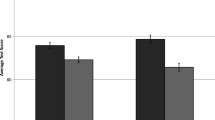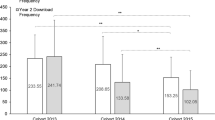Abstract
Traditionally, medical schools have tended to make assumptions that students will “automatically” engage in self-education effectively after graduation and subsequent training in residency and fellowships. In reality, the majority of medical graduates out in practice feel unprepared for learning on their own. Many medical schools are now adopting strategies and pedagogies to help students become self-regulating learners. Along with these changes in practices and pedagogy, many schools are eliminating a cornerstone of extrinsic motivation: discriminating grades. To study the effects of the switch from discriminating to pass–fail grading in the second year of medical school, we compared internal and external assessments and evaluations for a second-year class with a discriminating grading scale (Honors, High Pass, Pass, Fail) and for a second-year class with a pass–fail grading scale. Of the measures we compared (MCATs, GPAs, means on second-year examinations, USMLE Step 1 scores, residency placement, in which there were no statistically significant changes), the only statistically significant decreases (lower performance with pass fail) were found in two of the second-year courses. Performance in one other course also improved significantly. Pass–fail grading can meet several important intended outcomes, including “leveling the playing field” for incoming students with different academic backgrounds, reducing competition and fostering collaboration among members of a class, more time for extracurricular interests and personal activities. Pass–fail grading also reduces competition and supports collaboration, and fosters intrinsic motivation, which is key to self-regulated, lifelong learning.
Similar content being viewed by others
Notes
References
Bloodgood, R. A., Short, J. G., Jackson, J. M., & Martindale, J. R. (2009). A change to pass-fail grading in the first two years at one medical school results in improved psychological well-being. Academic Medicine, 84(5), 655–662.
Deci, E. L. (1992). The relation of interest to the motivation of behavior: a self determination theory perspective. In K. Renninger, S. Hidi, & A. Krapp (Eds.), The role of interest in learning and development. Mawah, NJ: Lawrence Erlbaum.
Dietrick, J. A., Weaver, M. T., & Merrick, H. W. (1991). Pass-fail grading: A disadvantage for students applying for residency. The American Journal of Surgery, 162(1), 63–66.
Gonella, J. (2004). An empirical study of the predictive validity of number grades in medical school using 3 decades of longitudinal data: implications for a grading system. Medical Education, 38, 425–434.
Gutman, L., & Grufferman, S. (1985). Impact of medical school class ranking systems on applicants’ ratings for residency positions. Journal of Medical Education, 60, 684–691.
Kohn, A. (1986). No contest: The case against competition. Boston, MA: Houghton Mifflin.
Phelps, R. P. (Ed.). (2005). Defending standardized testing. Mahwah, NJ: Lawrence Erlbaum Associates, Inc.
Phillips, J. (1965). An application of intermittent grading. The Clearing House, 39, 306.
Pintrich, P. (1994). Handbook of self-regulated learning. San Francisco, CA: Jossey-Bass.
Pintrich, P. R., & DeGroot, E. (1990). Motivational and self-regulated learning components of classroom academic performance. Journal of Educational Psychology, 82(1), 33–40.
Provan, J. (1995). Preferences of program directors for evaluation of candidates for postgraduate training. Canadian Medical Association Journal, 153(7), 919–923.
Robins, L., Fantone, J., Oh, M., Alexander, G., Shlafer, M., & Davis, W. K. (1995). The effect of pass-fail grading and weekly quizzes on first-year students’ performances and satisfaction. Academic Medicine, 70(4), 327–329.
Rohe, D., Barrier, P., Clark, M., Cook, D., Vickers, K., & Decker, P. (2006). The benefits of pass-fail grading on stress, mood and group cohesion in medical students. Mayo Clinic Proceedings, 81(11), 1143–1148.
Schunk, D. H., & Zimmerman, B. J. (Eds.). (1998). Self-regulated learning: from teaching to self-reflective practice. New York: Guilford Press.
Scoles, P. (2008). Comprehensive review of the USMLE. Advances in Physiology Education, 32, 109–110.
Smith, K. A., Sheppard, S. D., Johnson, D. W., & Johnson, R. T. (2005). Pedagogies of engagement: Classroom based practices. Journal of Engineering Education, 94(1), 1–15.
Vansteenkiste, M., Simons, J., Lens, W., Sheldon, K., Kennon, M., & Deci, E. (2004). Motivating learning performance and persistance: The synergistic effects of intrinsic goal contents and autonomy-supported contexts. Journal of Personality and Social Psychology, 87(2), 246–260.
Vosti, K., & Jacobs, C. (1999). Outcome measurement in postgraduate year one of graduates from a medical school with a pass-fail grading system. Academic Medicine, 74, 547–549.
Weed, L. (1997). New connections between medical knowledge and patient care. British Medical Journal, 315, 231–235.
Weller, L. (1983). The grading nemesis: An historical overview and a current look at pass-fail grading. Journal of Research and Development in Education, 17(1), 39–45.
White, C. B. (2005). Self-regulated learning and self-assessment in medical education: Is it all Latin to medical students? Doctoral Dissertation, University of Michigan: AAT3186789.
White, C. B. (2007). Smoothing out transitions: How pedagody influences medical students’ achievement of self-regulated learning goals. Advances in Health Sciences Education, 12(3), 279–297.
White, C. B., & Gruppen, L. D. (2007.) Self-regulated learning in medical education. Association for the study of medical education: Understanding medical education.
Zimmerman, B. J. (2000). Attaining self-regulation: Social-cognitive perspectives. In M. Boekaerts, P. R. Pintrich, & M. H. Zeidner (Eds.), Handbook of self-regulation. San Diego, CA: Academic Press.
Zimmerman, B., Bonner, S., & Kovach, R. (1996). Developing self-regulated learners: Beyond achievement to self-efficacy. Washington, DC: American Psychological Association.
Acknowledgments
The authors would like to acknowledge Joel A. Purkiss, Ph.D., for his assistance with data analysis.
Author information
Authors and Affiliations
Corresponding author
Rights and permissions
About this article
Cite this article
White, C.B., Fantone, J.C. Pass–fail grading: laying the foundation for self-regulated learning. Adv in Health Sci Educ 15, 469–477 (2010). https://doi.org/10.1007/s10459-009-9211-1
Received:
Accepted:
Published:
Issue Date:
DOI: https://doi.org/10.1007/s10459-009-9211-1




